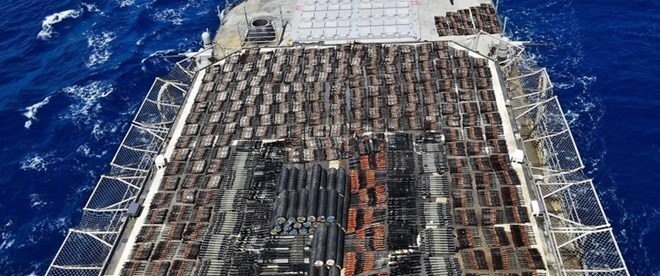
Sunday March 2, 2025

A U.S. Navy vessel displays thousands of seized assault rifles, machine guns, and rocket-propelled grenades (RPGs) on its deck after intercepting an illicit arms shipment in the Arabian Sea. (© U.S. Navy Photo)
Mogadishu (HOL) — The United Nations Security Council has renewed and reinforced its maritime interdiction measures on Somalia on Friday, aiming to strangle weapons smuggling routes and cripple Al-Shabaab’s illicit trade network.
In a unanimous decision, the 15-member Council adopted Resolution 2775 (2025), extending enforcement provisions initially introduced in Resolution 2182 (2014), expanded in Resolution 2607 (2021), and last renewed under Resolution 2762 (2024). The latest mandate, effective until March 3, 2025, reaffirms that Al-Shabaab’s operations—including terrorist attacks and black-market commerce—pose a direct threat to regional and global security.
The resolution grants UN Member States the authority to intercept and inspect vessels suspected of carrying weapons or illicit charcoal in Somali waters and throughout a broader maritime zone, including the Arabian Sea and the Persian Gulf. Nations enforcing the embargo must have “reasonable grounds” to believe a ship is transporting prohibited arms, military equipment, or components used in improvised explosive devices (IEDs).
Additionally, the measure empowers states to seize and dispose of any contraband discovered during inspections. Charcoal, which has been banned from export under UN sanctions since 2012, may now be resold under the strict oversight of the Somalia and Eritrea Monitoring Group, ensuring that proceeds do not fund armed groups.
While the Somali government is no longer subject to an arms embargo following the Security Council’s 2023 decision to lift restrictions on its security forces, an arms embargo remains in effect against Al-Shabaab and other non-state actors. Authorities say that maritime interdictions remain a crucial tool to prevent weapons from reaching Al-Shabaab and other non-state actors. The militant group continues to exploit smuggling routes, using both marine and overland networks through neighbouring countries to acquire firearms, explosives, and military-grade equipment.
International naval patrols have intercepted multiple arms shipments linked to Al-Shabaab, but enforcement remains a challenge due to the group’s ability to adapt. Smugglers use small fishing vessels, dhows, and unregistered cargo ships to transport weapons, often disguising illicit cargo as legitimate trade. The militant group also benefits from porous land borders, making interdiction efforts on sea and land equally critical.
Despite progress in strengthening its security forces, Somalia’s ability to police its own waters remains limited. The Somali Navy and Coast Guard lack the resources to enforce maritime security effectively, forcing the government to rely on international naval coalitions to curb smuggling activities. Corruption and jurisdictional disputes further complicate enforcement, allowing arms and illicit goods to slip through weak monitoring mechanisms.
The UN’s 2012 ban on Somali charcoal exports was meant to sever one of Al-Shabaab’s primary sources of income. While it has disrupted the group’s financial networks, the insurgents, however, have proven adept at circumventing restrictions, relying on established smuggling routes over porous land borders across the Horn of Africa and using illicit charcoal exports to sustain their revenue streams—much of the contraband making its way to Gulf nations.
The embargo has also devastated Somalia’s charcoal industry, a vital livelihood for thousands of traders, labourers, and rural communities. Many now call for a reassessment of the policy, arguing that it has done more harm to ordinary Somalis than to the militant networks it was meant to weaken.






